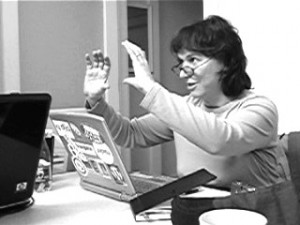
I recently had the free time and a corresponding strong interest in attending a seminar at the Institute for Advanced Legal Studies on freedom of expression and how it is playing out with relation to the Internet. Attending seminars was something not even on my radar in the first days of the LLB program at City, but as I begin to settle into a cycle and what was once almost overwhelming becomes a known factor, something that can be managed, I am glad to find myself able to explore my interests in these outlets. I cannot say I am certain of how my interests will guide my legal career, but human rights will always be a foundation for my legal career, and the experience of this seminar was fantastic in the way it provided a broader context to our academic studies at City.
The seminar was led by one of City’s own, Professor Lorna Woods. She is a director at City’s Centre for Law, Justice & Journalism, and has practical experience as a solicitor in the field, as well as authoring leading textbooks on EU law and the subject in question. In short, Professor Woods is the quintessential definition of an expert in the field. She guided the lecture along several main points, the exploration of the Internet as a right, the exploration of how far the laws on expression and the Internet can be pushed, and an analysis of the Internet itself. Is it something new, or just a new forum for the common interpretation of the law on speech? All aspects of this lecture were interesting, but I found myself compelled strongly by the first and last pillars of the lecture.
In search of the right
What really compelled me about this first point was that I was forced to think outside of my own bias on this subject. I always love it when that happens, because that’s when I feel you can really learn things. I’ll admit that I walked into this seminar with a clear notion that if the Internet was, if not already a statutorily defined right, then at least something confirmed by common law. The lecture demonstrated that I was not alone in my thinking, with the data supporting that nearly 80% of people at least somewhat agree.
That is where my layman’s understanding of the topic came abruptly against the real issues at law. While there have been some cases on specific instances, there is no definitive common law on speech and the Internet, and one of the critical questions that informs the debate is the push and pull between rights and ownership. The Internet itself may be a forum for speech, but it is still owned largely by companies who seek to guard their own rights to control their property, their infrastructure of the Internet. That battle has yet to play out fully in the court. In addition to that, there is the concept of time as it relates to the law, and the Internet. In the timeline of people, the Internet has been around for a good amount of time, roughly two decades. However, in the timeline of the law, two decades is still relatively fresh. There still needs to be more time for the courts to react to the rapid growth and impact the Internet has had on the EU and the world in general.
The legal world is catching up to the Internet, however. Some cases are coming through the EU courts now which will have a strong effect on this question of rights of access to the Internet. Jankovskis v. Lithuania (no 21575/08) is a good case to watch for a bellweather, consisting of a prisoner’s suit in the EU courts to declare his access to the Internet as an inalienable right. The case has only been communicated so far, and a decision is likely to come late in 2012.
Framing the discussion

One framework within which these cases and the debate argues is Article 10 of the European Convention on Human Rights, which broadly defines the right to freedom of speech, but does not directly address the Internet, and also provides for reasonable restrictions on that speech as necessary for various reasons such as national security and public safety.
It is this ambiguity that creates the debate between the positive and the negative responsibilities and powers of the state actors, the swing between speaker’s rights and the more commonly favored audience’s rights when considering free speech, and the debate over how broad to permit the speech to be, what right it has to offense or shock, or even what is itself speech.
The question brought by Professor Woods was whether or not the well known Pirate Bay, who claims their copyright breaches are freedom of speech, is really so. Can “pure” copyright infringement be freedom of speech if not accompanied by any other form or purpose? Those questions and more are working their way through the courts, and they lead to the last pillar of the lecture, whether or not the Internet itself must be examined in a different light from other forums.
The nature of the beast
So, is the Internet “different”, or are we just speaking of the Internet as another medium within which the rights to expression are given and regulated in the same manner. In what way does the context of the Internet inform this analysis? Professor Woods gave the suggestion to the group that while the Internet is definitely a game changer in terms of information dissemination and impact on lives, it is perhaps not the Internet that is special, but freedom of expression itself that is special. It has been called a “meta right” by the International Covenent on Civil and Political Rights, by which it is meant that it is a right upon which other rights rely. That resonated with me strongly. The EU has not fully articulated this in law, and even when or if it is fully articulated as a rule of law or statute, administration will still be complex and debatable. What would constitute a “minimum” right to this Internet access? Are there situations where restrictions can be imposed as punitive measures?
There may not be much longer to wait. Jankovskis v. Lithuania, slated to give a ruling later this year, is joined by other cases which have been communicated but not yet published. The U.N, UNESCO, and other entities are beginning to weigh in on this topic, and while within the law one does not usually see a leap off a cliff, we may be “minding the gap” as courts begin to interpret the Internet in a fundamentally more crucial role in human rights.
Never start your conclusion with “in conclusion”
In conclusion, I would strongly encourage anyone who sees an event and has their curiosity piqued to satisfy that urge. We all have busy schedules as students at City, from year 1 on, but the opportunity to hear the experts in the fields discuss their personal research is a fresh break from the lectures and tutorials that populate our academic discourse, or the reams of pages we’re poring over daily.
It provides an opportunity to see things from a more advanced view, as professors pose the questions and the topics in a more professional rather than educational role, and it also allows an opportunity to seek out specific interests that might not be covered by modules.
I would suggest that anyone interested in some of the broad aspects I ran across in this lecture refer themselves to the slides from Professor Woods, which provide an overview of the lecture. They are available on the Lawbore Slideshare. The slides contain a wealth of information including further cases and points of discussion that I was not able to shoehorn into this article for want of space. Nothing compares to listening in person to the expanded discussion, but they will provide a good starting point.
You might be interested to read the report from the Council of Europe Parliamentary Assembly: Protection of freedom of expression and information on the Internet and online media (Feb 2012).
Sean Knight is a first year student on the LLB course at The City Law School.
